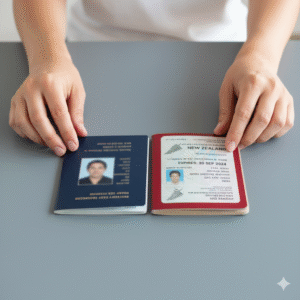What is section 49(1) of the immigration act 2009
There are a lot of rules and sections to understand when it comes to immigration in New Zealand, which can make things seem complicated. Section 49(1) of the Immigration Act 2009 is one of the most important parts for many new residents. This section lists the rules that come with a resident visa. These rules affect where you can live and how long you must stay in the country.
You need to know these things to have a smooth settlement process. This guide will explain what Section 49(1) means, who it applies to, and what you need to do to follow its rules. We’ll look at what these conditions mean in real life and explain how to move from a conditional resident visa to a permanent one successfully.
The Immigration Act 2009: A New Way to Do Things
It’s helpful to know what the Immigration Act 2009 is about before getting into the details of Section 49. This law was made to bring New Zealand’s immigration system up to date by replacing the old Immigration Act 1987. New Zealand needed a legal system that was more flexible, responsive, and secure to control who could enter and live in the country because the world had changed so much.
The main goals of the 2009 Act are:
- Managing immigration in a way that is good for New Zealand as a whole.
- Making it easier for tourists and skilled immigrants to come to the country and help the economy and culture.
- Making sure New Zealand’s borders are safe.
- Upholding fairness and justice in immigration decisions.
The Act set up a single system for all visas and gave immigration officers new powers. It also made different types of visas, like the resident visa, which is where Section 49 comes in.
What does Section 49(1) of the Immigration Act 2009 say?
Section 49(1) is an important part of the Act because it gives immigration officers the power to set certain conditions on a resident visa. These conditions are not arbitrary; they are designed to ensure that the visa holder fulfills the commitments they made in their application.
Section 49(1) of the Immigration Act 2009 says exactly this:
An immigration officer can put conditions on a resident visa if:
(a) the holder of the visa was given the visa because they met the requirements of a residence instruction that is listed in the immigration instructions as a residence instruction that this section applies to; or (b) the holder of the visa was given the visa as the partner or dependent child of a person described in paragraph (a).
Let’s put this in simple terms:
- Your resident visa can have extra conditions added to it by an immigration officer.
- This is usually the case if you were granted residency under a specific policy that requires you to fulfill certain obligations after you arrive, such as the Skilled Migrant Category or a number of business or investor visas.
- If the main applicant has conditions on their visa, their partner and dependent children who are also applying will usually have the same or similar conditions.
These conditions are like a bridge that makes sure you keep the promises you made when you applied for your visa, like getting a job, making an investment, or promising to live in a certain area.
What do the Section 49 Conditions mean?
The conditions set out in Section 49(1) depend on what kind of resident visa you have. The point is to make sure you really want to live in New Zealand. These are some of the most common conditions you might run into:
Resident Visa for Skilled Migrant Category (SMC)
If you got residency because you were offered a skilled job, you will probably have to:
- Start working in your skilled job within three months of getting to New Zealand.
- Remain in that skilled employment for a specified period, often at least three months.
- If you lose your job for any reason, let Immigration New Zealand (INZ) know.
Residence from Work (Employer with Accreditation)
Like the SMC, if you got your residency through a legitimate employer, your conditions will be tied to that job.
Visas for Business and Investors
For people on business or investor pathways, the rules are more complicated and focus more on money. They could include:
- Moving your chosen investment funds to New Zealand within a certain amount of time.
- Putting that money into a good investment vehicle.
- Keeping the investment for the amount of time needed (for example, four years).
- Being in New Zealand for at least a certain number of days each year.
The “Section 49 conditions” are the exact things you need to do to show that you have followed the rules of your visa.
How to Prove You Have Met Section 49 Conditions
You must show proof to Immigration New Zealand once you have met the requirements. This is an important step because not doing it could put your path to permanent residency at risk.
The proof you need depends on your situation. Here are some examples:
- For conditions based on work: You may need to show your payslips, a letter from your boss confirming your job status and dates, and bank statements that show your salary being deposited.
- For investment-based conditions: Documents that could be used as proof include bank transfer statements, investment portfolio statements, and letters from a financial advisor or fund manager confirming your investment..
When you apply to have the conditions on your visa removed, which is often when you apply for a Permanent Resident Visa or a change in travel conditions, you usually send in this evidence.

Other Sections: Section 50’s Character Requirements
Section 49 conditions are often related to other parts of the Immigration Act, especially Section 50.
If there are concerns about someone’s character, Section 50 gives immigration officers the power to put conditions on a resident visa. This part is different from Section 49, but they can both apply at the same time. For instance, if someone applies for a character waiver and has a minor conviction, INZ might require them to stay of good character for a certain amount of time under Section 50.
A person may be able to get a resident visa if they meet the requirements of both Section 49 and Section 50. This means that they must not only keep their job or investment promises, but they must also avoid any more problems with their character.
Section 50 and Character Waivers
You might need to ask for a character waiver if you have a character problem. This means giving a full account of your situation, proof of your recovery, and letters of support.
How to write a letter of support or forgiveness for immigration:
- Be honest and clear: Be honest about what happened and don’t make excuses.
- Feel bad: Admit the mistake and say how sorry you are.
- Show how things have changed: Show proof of rehabilitation by finishing classes, doing community service, or keeping a clean record
- Get the papers you need: Letters from family, friends, or community leaders saying good things about you can be very helpful.
If you get a character waiver, you will usually get a visa under Section 50. This means you will be on a “probationary” period of good behavior.
What Happens if You Don’t Follow the Rules?
Not meeting the requirements in Section 49(1) can have very bad effects. You could be deported if you don’t do something. If you can’t meet your conditions because of things that are out of your control, like losing your job or your business failing, you need to get in touch with Immigration New Zealand or an immigration expert right away.
You might be able to ask for a change in conditions in some cases. This, however, is not guaranteed and needs a good reason.
Comparing Section 49 to Other Countries
A lot of countries have similar ways to make sure that migrants keep their promises.
- Australia: The Subclass 189 (Skilled Independent) visa has fewer requirements, but many regional or employer-sponsored visas (like the Subclass 491) require you to live and work in a certain area for a number of years.
- Canada: The Express Entry system in Canada is based on points, just like New Zealand’s old SMC. Most of the time, people who want to apply for a Provincial Nominee Program must live in the province that nominated them.
- United Kingdom: In the UK, people who have visas like the Skilled Worker visa must keep working for the company that sponsored them.
Section 49 of New Zealand’s immigration laws is a common part of modern, managed immigration systems that make sure that migration programs reach their economic and social goals.
Be sure to take the next step.
Anyone with a conditional resident visa in New Zealand needs to know what Section 49(1) of the Immigration Act 2009 says. These conditions are required for you to become a permanent resident. You can get through this process easily and successfully if you know what you need to do, prepare your evidence carefully, and act in good faith.
This part of immigration law can be hard to understand, and people often need specific advice based on their own situations. If you’re not sure about your situation or need help getting your evidence or application ready, getting professional help can clear things up and put your mind at ease.







